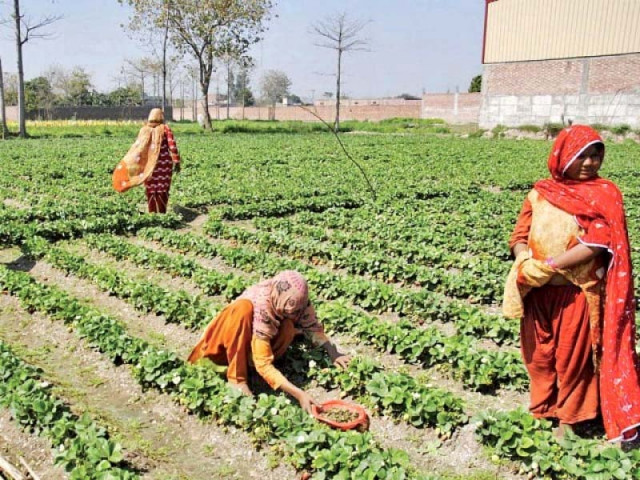Sindh Assembly grants rights to women in agriculture
Workers gain equal pay, leave and a seat at the decision-making table

Women in agriculture, one of the most marginalised sectors of society, have been given unprecedented rights in a new bill passed by the Sindh Assembly. PHOTO: FILE
According to the Sindh Women Agriculture Workers Bill 2019, women in farming, fisheries and livestock will not only receive pay in cash for their work, equal to that received by male workers, but will also participate in decision-making.
The bill, moved by provincial parliamentary affairs minister Mukesh Kumar Chawla, said that women would be empowered and payment for their work would not be less than the minimum wages fixed by the government for male workers.
‘Climate change adversely affecting agriculture sector’
Before the law was passed, there was little concept of wages or rights for women in agriculture, even though the majority of them work around the clock while also running their homes and taking care of their children. The new law, however, grants extensive rights to a portion of the population that has been marginalized till now.
“The working day of a woman in the agriculture sector shall not exceed eight working hours and shall not commence until one hour after daybreak or continue beyond one hour prior to sunset,” the law stated, adding that these women shall take time off work due to sickness or for antenatal and post-natal care, routine check-ups and visits, without incurring any financial or other penalty.
Under the new bill, female agricultural workers are entitled to 120 days of maternity leave as well as iddat leave for the duration set in their faith. Furthermore, women with children up to the age of two years may breastfeed their children in safe, hygienic conditions, while also receiving support to exclusively breastfeed the child for the first six months of its life.
University of Agriculture, Faisalabad produces 1,851 PhDs
According to the bill, “The women in this sector shall perform work free from all forms of harassment or abuse as laid out in the relevant law prevailing in the province.” They shall also receive a written contract of employment if they wish, and are entitled to fair arbitration, particularly with respect to rates of pay, payment schedules, working conditions and health and safety at the workplace.
The law also goes on to grant them political rights, including the right to form or join a union or association for collective bargaining, social welfare, community development, economic profit or accessing public services.
In a sector riddled with discrimination against women, the bill states that they cannot be discriminated against in terms of employment opportunities, wages or working conditions, whether it is on the grounds of sex, land ownership, caste, religion, ethnicity or residential status.
Higher yield to be gained through technology: Punjab Agriculture Dept
The Benazir Card
With the passing of the law, the Sindh government, through the provincial labour and human resources department, will maintain a register of women workers in agriculture on the union council level.
The registration process will be initiated once the law is enacted, as a pre-requisite for the provision of their benefits, incentives and privileges. The registered women, if they meet the criteria, will be issued Benazir Women Income Agricultural Worker’s Cards, also known as Benazir Cards.
Any worker holding this card shall be free to make associations or groups of her choice, while a group consisting of at least five card holders can apply to register as a women agricultural workers’ union.
Registered workers or groups can apply for government asset transfers, credit, social security and subsidies, as well as for the arbitration and enforcement of contracts.
The provincial government will also permanently set up the Benazir Women’s Support Programme with an endowment fund under the labour and human resources department.
‘Food production systems are vulnerable to climate’
A seat at the table
Under the newly passed bill, the Sindh labour and human resource department will set up tripartite arbitration councils at the provincial, district, taluka and union council level, with representatives of these workers, employers, and government officials.
These councils will serve the purpose of setting piece-rates for various agricultural tasks, such as cotton harvesting, chili harvesting and wheat harvesting.
Moreover, they will promote safe and hygienic working conditions for women agricultural workers, which include the provision of clean drinking water and protection from harassment, abuse, pesticides and other hazardous substances.
The provincial departments of health, population welfare, local government and women development have further been asked to prepare and implement a two-year plan to ensure that their outreach and services are accessible and appropriate to the needs and rights of women in this sector.
Published in The Express Tribune, December 20th, 2019.



















COMMENTS
Comments are moderated and generally will be posted if they are on-topic and not abusive.
For more information, please see our Comments FAQ